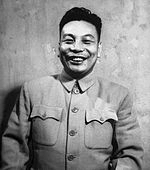How to Pronounce Chiang Ching-kuo
#50
Most Popular
Boost
Apr 27, 1910 Zhejiang, China Died on 13 Jan 1988 (aged 77)
President of the Republic of China (Taiwan)
TaurusChiang Ching Kuo, Date of Birth, Place of Birth, Family, Facts, Age, Net Worth, Biography and More in FamedBorn.com

President of the Republic of China (Taiwan)
Taurus